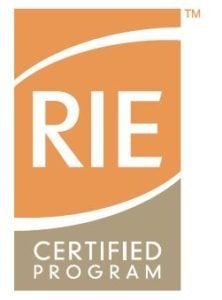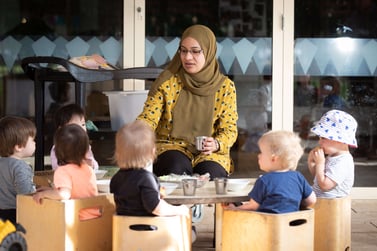Exploring the importance of interactions, connections and relationships with infants, within the context of your early childhood teams.
By Shayla Martinez, Gowrie NsW
Working with infants has been such an amazing journey throughout the years. I always thought I was very knowledgeable in what I do in an infant’s room, with the correct and ‘best’ practices. Following the room routine to a ‘T’. I would have the day all planned with scheduled times for the child’s routine to ensure I would get through the day. But others could see this way of working differently! For me, it was only until four years ago that I had a professional life changing experience, and I began to look at my ways of working in a different light. I was fortunate to work with some inspiring managers and mentors that shifted my way of thinking.
Reflecting on practice
 I was introduced to ‘RIE’ and ‘wow’ this made me really reflect on the practices I, previously, thought I was on point with. I really started to reflect on my interactions with infants. I also started to consider the child’s perspective - what did my teaching, moments of time and relationships look like from the child’s perspective?
I was introduced to ‘RIE’ and ‘wow’ this made me really reflect on the practices I, previously, thought I was on point with. I really started to reflect on my interactions with infants. I also started to consider the child’s perspective - what did my teaching, moments of time and relationships look like from the child’s perspective?
I could see that the relationships between educators and children - we were really working like robots, rushing each child - especially when it came to each child's mealtime. This was a real eye opener, what was I doing to the children? Were we really respecting our children? Was it a pleasurable calming experience for each child during their mealtime? I could say no, not really at all.
Team relationships
In July 2020 I began my journey at Gowrie NSW Erskineville Early Education and Care - in the birth to one space. As a team of three, we focused on strengthening one particular area, mealtimes.
As a leader, to succeed with a team and particularly this team, an important tool was the relationships you have with your team. I tried and tested many tactics to allow each team member to be on board and be part of the journey. To be honest, at times, there were challenges, but we found a way!
We had many questions. Where were we going to start? The way of working at Gowrie NSW– our foundations and philosophy became the starting point. We changed our dining environment. We asked the question.
How do our primary caregiving moments look?.jpg?width=320&name=Oslo%20LithgowDSCF0845%20(1).jpg)
Through our discussion of this question, we agreed we all had a good perspective and relationship with each child. So, the next step was to strengthen our relationships with each other – as adults and to look at ‘what was going to work for us in communicating with one another?’
We found that verbal communication to one another in quiet moments and in room meetings where we shared in discussion about our journey in a very respectful manner was a meaningful way to support our change and to think critically about our practices.
When we looked at mealtimes our focus was about: ‘slowing down and allowing each child to have the time to have a pleasurable meal’.
As a reflection we asked: ‘what does slowing down look like?
From this reflection, we minimised our meals to small groups to respect children's rhythm of the day. It was important to prepare so we ensured that our trolleys had all the things we needed for our mealtimes. By being prepared and organised prior to the mealtime, educators didn’t need to get up and walk away to get something that was missing.

Consistency and infant cues
This reflection was ongoing, and it was through seeing it as a learning experience that we saw the importance of always being available for the child without interruptions of forgetting something or needing to step away from the child.
We looked at the question:
What does consistency look like, what does this mean for us?
Unpacking this question together and documenting what worked and did not work was a way to record the changes to our practices. We analysed what cues and gestures we missed from each child and then went back to reflect on what we missed. For example, we identified how important things like children's eye contact cues were because this emphasised the importance of being consistent – it showed us that the children were responding positively.Other questions for our reflection included:
How were we inviting/ transitioning each child to have their mealtimes?
What was the message we were sending to each child through our actions?
We realised that of upmost importance was to observe the child and for the child to be involved in the change. We knew that we still had a lot to work on, but this is what it is all about. It really takes time! The quality of care improved every day and yes, there were many times we got stuck but that was part of the process. It was important that it was peaceful for each child equally important was seeing how we as educators were learning about ourselves and how we see children as really capable learners. Children were feeling safe and secure, they were being listened to and we observed how the infants in our care appeared more relaxed. Through this process of change, we learned to trust the child to succeed through the child being involved in their mealtime ritual. These moments were real, powerful and enlightening for us to see.

Intensive 10 day RIE® Foundations Course - October 2021
This ten-day intensive course is for professionals who want to develop and deepen their understanding of infant development and care. Course content includes an overview of Magda Gerber’s Educaring® Approach – gross motor, fine motor and social-emotional development of the infant – designing the environment – planning the curriculum – issues in parenting. RIE® Foundations™ training can be applied in settings such as the natural family, the childcare center, and family childcare. The format for the course includes lectures, discussions, videos and visits to infant care centers.






.jpg)


